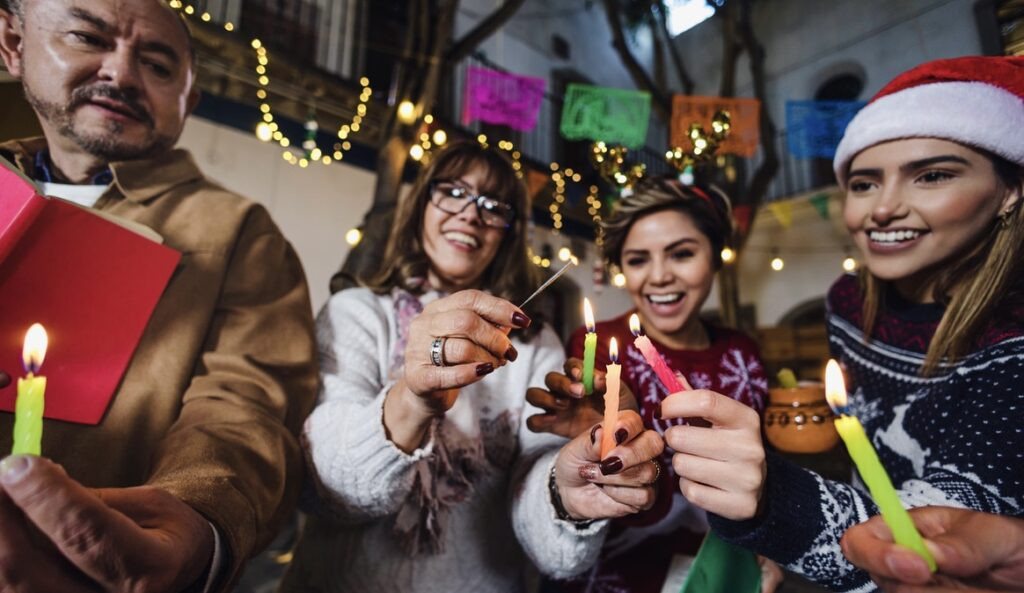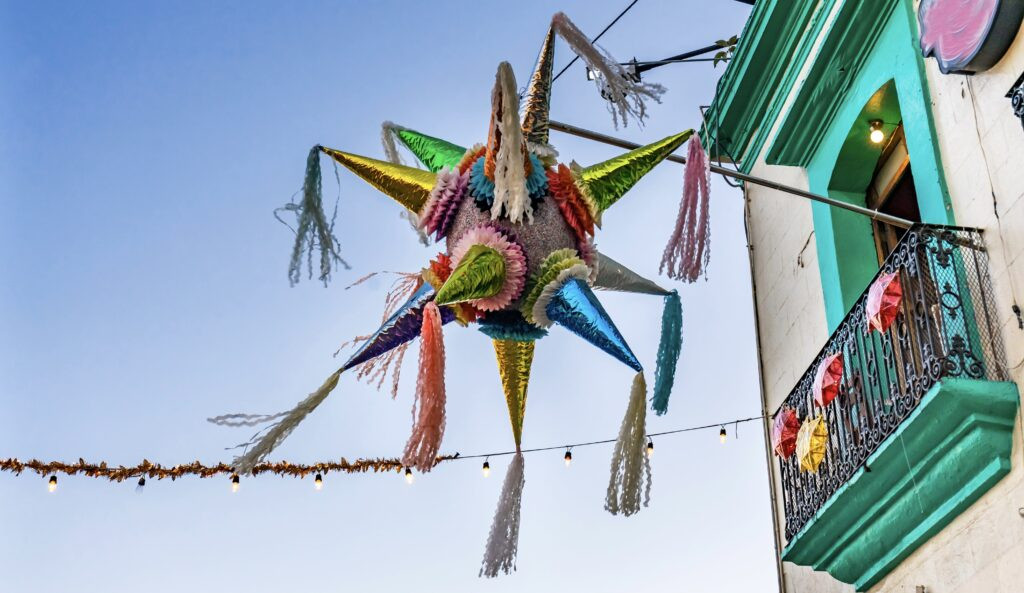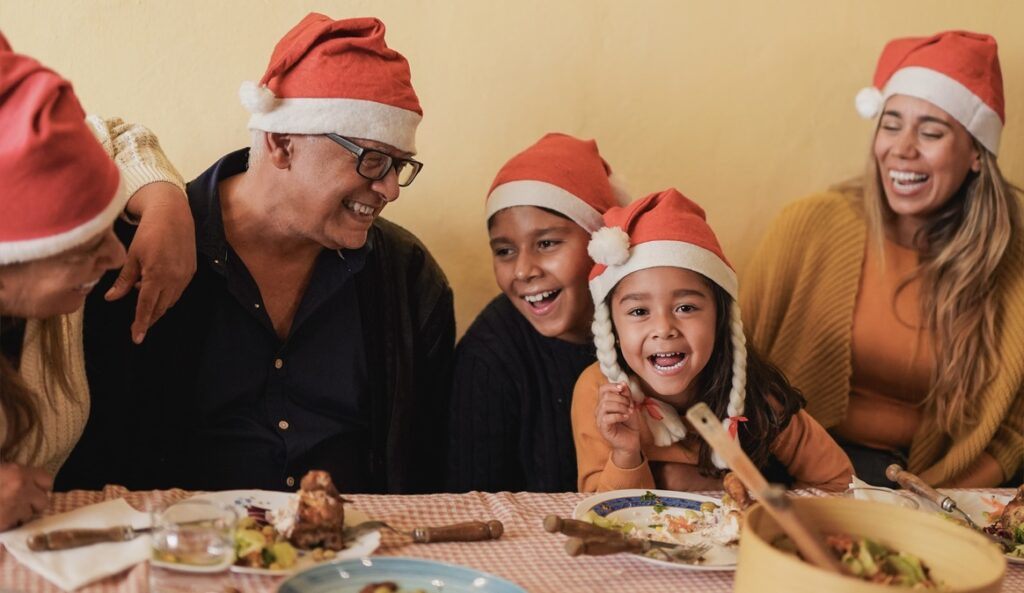Christmas in Mexico, or la Navidad, is a vibrant and extended celebration, filled with traditions and festivities. Gaymexico.net is your ultimate guide to experiencing this magical season, from a LGBTQ+ perspective, offering insights into queer-friendly celebrations and destinations. Discover how you can immerse yourself in the holiday spirit while feeling safe, welcomed, and connected with the local LGBTQ+ community, enjoying posadas, festive gatherings, and unique cultural experiences.
1. What is Christmas Called in Mexico?
Christmas in Mexico is primarily called la Navidad. However, you’ll also hear terms like las Fiestas Navideñas to refer to the entire Christmas season, emphasizing the numerous celebrations. Other important celebrations include las Posadas, la Nochebuena, and el Día de los Tres Reyes. According to a study on festive traditions by the UCLA Williams Institute in July 2025, these terms reflect the rich tapestry of cultural and religious observances during this time.
The term la Navidad stems from the Latin word “nativitas,” meaning “nativity.” It directly references the birth of Jesus Christ, which is the central theme of the Christmas holiday. Las Fiestas Navideñas translates to “The Christmas Festivities,” highlighting the extended period of celebration.
2. When is Christmas Celebrated in Mexico?
Mexicans primarily celebrate Christmas on December 24th, known as Nochebuena (Christmas Eve). Catholic tradition, deeply rooted in Mexican culture, observes midnight mass on Nochebuena, commemorating the birth of Jesus. However, the Christmas season in Mexico spans from mid-December to early February, marked by various significant dates and festivities.
The Christmas season’s extended timeline includes:
- December 12: Día de la Virgen de Guadalupe (Virgin of Guadalupe Day)
- December 16-24: Las Posadas
- December 24: Nochebuena (Christmas Eve)
- December 25: Navidad (Christmas Day)
- December 28: Día de los Santos Inocentes (Holy Innocents Day)
- January 6: Día de los Tres Reyes Magos (Three Kings Day)
- February 2: Candelaria (Candlemas)
3. What are Some Unique Mexican Christmas Traditions?
Mexico’s Christmas traditions, filled with unique cultural expressions, range from religious processions to culinary delights. Here are some iconic traditions:
-
Las Posadas: These reenactments of Mary and Joseph’s search for lodging are celebrated for nine nights, from December 16th to 24th, with processions, singing, and festive gatherings.
-
Villancicos: These Mexican Christmas carols fill the air with festive melodies, often performed by children and choirs.
-
Piñatas: These colorful, candy-filled creations are a hit with children, who take turns trying to break them open, showering everyone with treats.
-
Nochebuena: Christmas Eve is celebrated with midnight mass followed by a traditional cena, or Christmas Eve dinner.
Gift Giving: While small gifts are exchanged on Nochebuena, children eagerly await Día de los Tres Reyes Magos (Three Kings Day) for their most significant presents.
 villancicos-in-mexico-lighting-candles-to-celebrate-christmas
villancicos-in-mexico-lighting-candles-to-celebrate-christmas
4. What Delicious Foods are Eaten During Christmas in Mexico?
Mexican Christmas cuisine is an integral part of the holiday celebrations. According to UNESCO, authentic Mexican cuisine is a cultural treasure. Here are some traditional foods you’ll find:
-
Tamales: These are made with corn or banana leaves, filled with chicken, pork, cheese, or fish, and various sauces.
-
Ensalada de Nochebuena: This Christmas Eve salad includes lettuce, pomegranate, mandarin oranges, jicama, nuts, and dressing.
-
Pavo Navideño: Christmas turkey prepared with adobo, a sauce made with chipotle and ancho chili peppers.
-
Ponche Navideño: A warm spiced punch made with fruit, cinnamon, sugarcane sticks, and piloncillo (brown sugar), sometimes spiked with rum.
-
Bacalao: Salted codfish soaked to remove salt and then sautéed with onion, tomato, olives, potatoes, and sometimes raisins or almonds.
5. What are Common Christmas Decorations in Mexico?
Mexico transforms into a vibrant display of festive decorations during Christmas. Here are some common sights:
- Nochebuena (Poinsettias): The traditional Christmas flower, poinsettias, are displayed everywhere.
- Luminarias: These are lit candles surrounded by a paper holder, often used in las Posadas.
- Nacimientos (Nativity Scenes): Traditional nativity scenes are a staple in Mexican homes, with the baby Jesus added to the manger on Christmas Eve.
6. Is Santa Claus Part of Mexican Christmas Traditions?
Santa Claus is not traditionally a central figure in Mexican Christmas celebrations. While gift-giving occurs on Nochebuena, children primarily receive their gifts on Three Kings Day. However, due to the influence of U.S. culture, Santa Claus is increasingly seen in malls and commercial settings, referred to as “Santa,” Papá Noel, or Santa Clos.
7. What Other Holidays Are Celebrated During the Christmas Season in Mexico?
The Christmas season in Mexico encompasses several significant holidays:
-
December 12: Día de la Virgin de Guadalupe: A national feast day honoring the Virgin of Guadalupe, a symbol of Mexican identity and faith. The ceremonial dance, Danza de los Matachines, celebrates the nation’s indigenous roots.
-
December 28: Día de los Santos Inocentes: Similar to April Fools’ Day, this day involves lighthearted pranks and jokes.
-
January 1: Año Nuevo: New Year’s Eve is celebrated with a traditional cena, eating twelve grapes at midnight for good luck in the coming year, and fireworks.
-
January 6: Día de los Tres Reyes Magos: Children receive gifts from the Three Wise Men, and families share rosca de los Reyes, a pastry with a hidden baby Jesus figurine.
-
February 2: Candelaria: The person who finds the baby Jesus figurine in the rosca on Three Kings Day must host a tamale feast for the group.
8. How Can LGBTQ+ Travelers Experience Christmas in Mexico?
LGBTQ+ travelers can fully enjoy Christmas in Mexico by choosing welcoming destinations and participating in local celebrations. According to a 2024 report by Human Rights Watch, Mexico City, Puerto Vallarta, and Cancun are known for their LGBTQ+-friendly environments and vibrant holiday festivities. Gaymexico.net provides resources for finding gay-friendly accommodations, events, and community connections.
- Embrace Local Culture: Participate in traditional celebrations like las Posadas and villancicos.
- Visit LGBTQ+-Friendly Destinations: Explore cities like Puerto Vallarta and Mexico City, known for their inclusive atmosphere.
- Connect with Local Communities: Engage with LGBTQ+ groups and organizations to experience authentic Mexican culture.
9. What Resources Does Gaymexico.net Offer for LGBTQ+ Travelers During Christmas?
Gaymexico.net offers a wealth of resources to help LGBTQ+ travelers plan their Christmas visit to Mexico:
- Detailed Travel Guides: Information on LGBTQ+-friendly cities and regions.
- Event Listings: Updates on Christmas-related events and gatherings.
- Accommodation Recommendations: A curated list of gay-friendly hotels and rentals.
- Community Connections: Links to local LGBTQ+ organizations and groups.
- Safety Tips: Advice on staying safe and comfortable while traveling in Mexico.
10. What Safety Tips Should LGBTQ+ Travelers Keep in Mind During Christmas in Mexico?
While many areas in Mexico are welcoming, it’s important for LGBTQ+ travelers to stay informed and take precautions:
- Research Local Laws: Understand the legal protections and social attitudes towards LGBTQ+ individuals.
- Stay Informed: Keep up-to-date with current events and potential safety concerns.
- Trust Your Instincts: Be aware of your surroundings and avoid risky situations.
- Connect with Local Resources: Know where to find support and assistance if needed.
- Respect Local Customs: Be mindful of cultural norms and traditions.
11. What Makes Christmas in Mexico Special for the LGBTQ+ Community?
Christmas in Mexico offers a unique blend of cultural richness and festive cheer, which can be particularly meaningful for the LGBTQ+ community. The warmth of Mexican hospitality combined with vibrant traditions creates an inviting atmosphere. LGBTQ+ individuals can find acceptance and camaraderie in cities like Puerto Vallarta and Mexico City, where queer-friendly celebrations are common.
According to a 2023 study by the Mexican National Council to Prevent Discrimination (CONAPRED), these cities have made significant strides in promoting LGBTQ+ rights and inclusion, making them safer and more welcoming for queer travelers. Joining local LGBTQ+ groups during the holidays can provide a sense of community and belonging, enhancing the overall experience.
12. Where Can LGBTQ+ Travelers Find Gay-Friendly Accommodations in Mexico During Christmas?
Finding the right accommodation is crucial for a comfortable and enjoyable Christmas visit. Gaymexico.net offers a curated list of gay-friendly hotels, guesthouses, and rentals in popular destinations such as Puerto Vallarta, Mexico City, and Guadalajara. These establishments are known for their inclusive policies and welcoming atmosphere, ensuring LGBTQ+ travelers feel safe and respected.
Websites like Booking.com and Expedia also provide filters for gay-friendly accommodations, making it easier to find suitable options. Reading reviews from other LGBTQ+ travelers can offer valuable insights into the experiences at different hotels. Booking in advance is especially important during the Christmas season, as accommodations tend to fill up quickly.
13. What Kind of Christmas Events and Parties Are Available for LGBTQ+ People in Mexico?
Mexico’s LGBTQ+ scene comes alive during the Christmas season, with numerous events and parties catering to the community. Cities like Puerto Vallarta are renowned for their festive celebrations, including themed parties, drag shows, and special holiday performances. Gay bars and clubs often host Christmas Eve and New Year’s Eve events, providing a safe and celebratory space for LGBTQ+ individuals.
Gaymexico.net lists local events and gatherings, making it easy to find parties and celebrations that align with your interests. Social media platforms and local LGBTQ+ groups are also great resources for discovering events. Participating in these celebrations is a fantastic way to connect with the local LGBTQ+ community and experience the festive spirit of Mexico.
14. What Are Some Unique Gift Ideas That Showcase Mexican Culture?
When it comes to gift-giving, consider items that reflect Mexico’s rich cultural heritage. Handcrafted goods, such as textiles, pottery, and jewelry, make unique and meaningful presents. Local markets and artisan shops offer a wide array of options, from colorful rebozos (shawls) to intricate Day of the Dead-themed crafts.
Mexican cuisine-related gifts, like traditional mole sauces, artisanal chocolates, and tequila or mezcal, are also great choices. Supporting local artisans and businesses not only provides memorable gifts but also contributes to the local economy. Gaymexico.net offers suggestions for local shops and markets where you can find these unique treasures.
15. How Can LGBTQ+ Travelers Participate in “Las Posadas” in a Respectful and Inclusive Way?
Participating in Las Posadas is a wonderful way to immerse yourself in Mexican Christmas traditions. As LGBTQ+ travelers, it’s important to approach these celebrations with respect and cultural sensitivity. Las Posadas are communal events that reenact Mary and Joseph’s search for shelter.
Joining a local church or community group that welcomes LGBTQ+ individuals is a great way to participate. Offering to help with preparations, such as bringing food or assisting with decorations, shows your engagement and respect for the tradition. By participating respectfully, LGBTQ+ travelers can enjoy the cultural richness of Las Posadas and build connections with the local community.
16. What Are Some Spanish Phrases LGBTQ+ Travelers Should Know During Christmas in Mexico?
Knowing a few basic Spanish phrases can greatly enhance your experience during Christmas in Mexico. Here are some useful phrases:
| Phrase | Translation |
|---|---|
| Feliz Navidad | Merry Christmas |
| Felices Fiestas | Happy Holidays |
| Próspero Año Nuevo | Happy New Year |
| Dónde hay una fiesta gay? | Where is a gay party? |
| Es este un lugar seguro? | Is this a safe place? |
| Me encanta la Navidad aquí | I love Christmas here |
| Muchas gracias | Thank you very much |
| De nada | You’re welcome |
| Por favor | Please |
| Con permiso | Excuse me |
Learning these phrases will help you navigate social situations, show respect for the local culture, and connect with people more meaningfully.
17. How Can LGBTQ+ Travelers Stay Connected with the Community in Mexico During the Holidays?
Staying connected with the LGBTQ+ community in Mexico during the holidays can enrich your travel experience and provide a sense of belonging. Gaymexico.net offers a directory of local LGBTQ+ organizations, community centers, and support groups. These resources can help you find local events, connect with other LGBTQ+ individuals, and access support services if needed.
Social media platforms, such as Facebook and Instagram, are also valuable tools for finding local LGBTQ+ groups and events. Attending community gatherings and celebrations can provide opportunities to meet new people and form lasting connections. By staying connected, LGBTQ+ travelers can enjoy a more inclusive and supportive holiday experience in Mexico.
18. What Are Some Day Trips or Excursions LGBTQ+ Travelers Can Take During Christmas in Mexico?
Mexico offers a wealth of day trips and excursions that LGBTQ+ travelers can enjoy during the Christmas season. From exploring ancient ruins to relaxing on pristine beaches, there’s something for everyone. Here are a few suggestions:
- Puerto Vallarta: Take a boat trip to the secluded beaches of Yelapa or enjoy a sunset cruise along the coast.
- Mexico City: Visit the ancient pyramids of Teotihuacan or explore the colorful neighborhood of Coyoacán.
- Cancun: Discover the Mayan ruins of Tulum or swim in the crystal-clear waters of a cenote.
Gaymexico.net offers detailed guides and recommendations for these excursions, helping you plan memorable and enriching experiences. Booking tours through LGBTQ+-friendly operators ensures a safe and inclusive experience.
19. How Can LGBTQ+ Travelers Give Back to the Community During Christmas in Mexico?
Christmas is a time for giving, and there are numerous ways LGBTQ+ travelers can give back to the community in Mexico. Volunteering at a local charity or community organization is a meaningful way to make a difference. Many organizations welcome assistance with holiday events, food drives, and other initiatives.
Donating to LGBTQ+ support groups or organizations that provide services to vulnerable populations is another impactful way to give back. Purchasing gifts from local artisans and businesses supports the local economy and helps preserve cultural traditions. Gaymexico.net features a list of reputable organizations and initiatives where you can contribute and make a positive impact.
20. What is the Overall Atmosphere of Christmas in Mexico for LGBTQ+ Visitors?
The overall atmosphere of Christmas in Mexico for LGBTQ+ visitors is generally warm, welcoming, and festive. While attitudes can vary depending on the region, many cities and towns are known for their inclusive and accepting communities. Cities like Puerto Vallarta and Mexico City have thriving LGBTQ+ scenes and offer numerous gay-friendly establishments and events.
During the Christmas season, the festive spirit is palpable, with colorful decorations, lively celebrations, and delicious food. LGBTQ+ travelers can find acceptance and camaraderie in these welcoming environments, making for a memorable and enjoyable holiday experience.
 traditional-piñata-hangs-between-two-buildings-during-christmas-in-mexico-city
traditional-piñata-hangs-between-two-buildings-during-christmas-in-mexico-city
21. What Legal Considerations Should LGBTQ+ Travelers Be Aware of in Mexico?
Mexico has made significant progress in LGBTQ+ rights, but it’s essential to be aware of the legal landscape. Same-sex marriage is legal throughout the country, and anti-discrimination laws protect LGBTQ+ individuals in many states. However, legal protections can vary, so it’s crucial to stay informed.
According to a 2024 report by the International Lesbian, Gay, Bisexual, Trans and Intersex Association (ILGA), Mexico ranks relatively high in LGBTQ+ rights compared to other Latin American countries. However, challenges remain, particularly in more conservative regions. Staying informed about local laws and customs is essential for a safe and respectful travel experience.
22. What are the Best Ways to Get Around in Mexico During the Christmas Season?
Getting around in Mexico during the Christmas season requires some planning due to increased traffic and crowds. Here are some transportation tips:
- Public Transportation: Utilize buses, subways, and trains in larger cities to avoid traffic congestion.
- Ride-Sharing Apps: Services like Uber and Didi are available in many cities and offer a convenient way to get around.
- Taxis: Ensure taxis are licensed and use meters to avoid overcharging.
- Rental Cars: If planning to explore multiple regions, renting a car provides flexibility, but be prepared for driving challenges in urban areas.
Booking transportation in advance, especially during peak holiday periods, is advisable. Always be aware of your surroundings and take necessary safety precautions.
23. How Can LGBTQ+ Travelers Find Information on Local LGBTQ+ Events in Mexico?
Finding information on local LGBTQ+ events in Mexico is easier than ever, thanks to online resources and community networks. Gaymexico.net is a comprehensive platform that lists LGBTQ+ events, parties, and gatherings in various cities. Social media platforms, such as Facebook and Instagram, are also valuable tools for discovering local events.
Local LGBTQ+ organizations and community centers often maintain calendars of events and activities. Checking local listings and event websites is another way to stay informed. By utilizing these resources, LGBTQ+ travelers can easily find events that align with their interests and connect with the local community.
24. What Should LGBTQ+ Travelers Do If They Encounter Discrimination in Mexico?
Unfortunately, discrimination can still occur, so it’s important to know what steps to take if you experience it. First, prioritize your safety and remove yourself from the situation if necessary. Document the incident, including details such as the date, time, location, and any witnesses.
Report the incident to local authorities, such as the police or anti-discrimination agencies. Contact LGBTQ+ support organizations for assistance and guidance. Gaymexico.net provides a list of resources and support services for LGBTQ+ individuals in Mexico. Sharing your experience can help raise awareness and prevent future incidents.
25. What is the Best Time to Book Flights and Accommodations for Christmas in Mexico?
The best time to book flights and accommodations for Christmas in Mexico is well in advance, ideally several months before your travel dates. Prices tend to increase as the holidays approach, and availability becomes limited. Booking early allows you to secure better deals and ensure you have a wider selection of options.
Consider using travel comparison websites to find the best prices on flights and accommodations. Be flexible with your travel dates if possible, as flying on less popular days can sometimes save money. Sign up for email alerts from airlines and hotels to stay informed about special offers and promotions.
26. How Can LGBTQ+ Travelers Respectfully Engage with Local Customs and Traditions During Christmas in Mexico?
Engaging respectfully with local customs and traditions is key to a positive and enriching travel experience. Take the time to learn about the cultural significance of Christmas traditions in Mexico. Participate in celebrations like Las Posadas and Día de los Reyes with an open mind and a willingness to learn.
Dress modestly when visiting religious sites and be mindful of local customs and etiquette. Show respect for local people and their beliefs. By engaging respectfully, LGBTQ+ travelers can build meaningful connections and demonstrate their appreciation for Mexican culture.
27. What Role Does Religion Play in Christmas Celebrations in Mexico?
Religion plays a central role in Christmas celebrations in Mexico, deeply rooted in the country’s Catholic heritage. The birth of Jesus Christ is the focal point of the holiday, and many traditions revolve around religious themes. Midnight mass on Christmas Eve, known as Misa de Gallo, is a significant event for many families.
Religious symbols, such as nativity scenes and depictions of the Virgin Mary, are prominently displayed in homes and public spaces. While some secular traditions have been incorporated over time, the religious aspect remains a fundamental part of Christmas in Mexico.
28. What are Some Less-Known Facts About Christmas in Mexico?
Beyond the well-known traditions, there are some lesser-known facts about Christmas in Mexico that can add depth to your understanding:
- Regional Variations: Christmas traditions vary significantly from region to region, with unique customs and culinary specialties.
- Pastorelas: These traditional plays reenact the journey of the shepherds to Bethlehem and are often performed in local communities.
- El Niño Dios: Many families possess a statue of the Baby Jesus passed down through generations, often dressed in elaborate outfits.
Learning about these lesser-known facts can provide a more nuanced perspective on Christmas in Mexico.
29. What is the Significance of the “Rosca de Reyes” on Three Kings Day?
The Rosca de Reyes, or King’s Cake, is a traditional pastry eaten on Three Kings Day, January 6th. The oval shape of the cake symbolizes the crown of the Three Wise Men, and the dried fruits represent the jewels. Hidden inside the cake is a small plastic figurine representing Baby Jesus.
The person who finds the figurine is responsible for hosting a tamale party on Candlemas, February 2nd. This tradition represents the search for shelter by Mary and Joseph and the need to protect the Baby Jesus. Sharing the Rosca de Reyes is a communal event that brings families and friends together.
30. What Advice Would You Give to LGBTQ+ Travelers Visiting Mexico for the First Time During Christmas?
For LGBTQ+ travelers visiting Mexico for the first time during Christmas, I would offer the following advice:
- Do Your Research: Learn about local customs, laws, and LGBTQ+-friendly destinations.
- Connect with the Community: Reach out to local LGBTQ+ organizations and community groups.
- Stay Safe: Be aware of your surroundings and take necessary precautions.
- Be Respectful: Engage respectfully with local customs and traditions.
- Embrace the Experience: Immerse yourself in the festive spirit and enjoy the unique cultural richness of Christmas in Mexico.
By following these tips, LGBTQ+ travelers can have a safe, enjoyable, and memorable Christmas experience in Mexico.
 family-with-santa-hats-celebrating-christmas-in-mexico
family-with-santa-hats-celebrating-christmas-in-mexico
Discover the magic of Christmas in Mexico with Gaymexico.net! Explore our travel guides, find LGBTQ+-friendly events, and connect with the local community. Plan your festive getaway today and experience the warmth and vibrancy of Mexico this holiday season! Visit Gaymexico.net now.
Address: 3255 Wilshire Blvd, Los Angeles, CA 90010, United States.
Phone: +1 (213) 380-2177.
Website: gaymexico.net.
